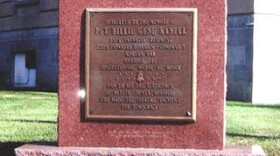It seems like Almost Yesterday that the largest tree in Charleston, Mo., was cut down. The giant cottonwood was said to be the largest and most loved tree in the city. Legend has it that the tree was fully grown when Missouri became a state in 1821 and that it witnessed the founding of the town in 1837.
But by 1933, Charleston had expanded and grown around the mighty cottonwood and it stood squarely in the center of State Street, directly behind of the home of Edwin P. Deal, a prominent resident and town historian.
Mr. Deal valued the past glory of the great tree as a city landmark; resting place for ball players; shade tree for horses and mules; and during the Civil War, an important lookout for approaching enemy forces. But by the mid-30s, the growing number of automobiles led many to believe that this obstacle to traffic should be removed, and in August of 1933, the city council voted to end the tree’s long history. In September, it came down.
But the action made citizens of Charleston aware of the value of their old and majestic trees and numerous protests came to Mayor E.E. Oliver and the city council.
Letters, songs and poems were directed to those whose actions led to the demise of the great tree.
No protest was more poignant than a poem that asked:
Mr. Mayor and Council, too
What in hell will you next do?
Cutting down our trees so grand;
Why not leave these monarchs stand?
Some of you in barefoot days
Often underneath them played.
And your folks before you, too,
What you ‘spect they think of you?
Cutting down the trees that bind
Memories of their childhood times.
Before you cut Deal’s cottonwood
Think how long that tree has stood;
Think how many boys and girls
With freckled face and tumbled curls
Who played beneath its branches wide
That now have crossed the great divide
For twice the allotted three score ten
The Good Book has allowed for men
This cottonwood has played its part
When times were good and times were dark.
Its branches held the lookout man
When guerillas sought to sack our land;
And who is it with truth can’t say
It saved the town we have today.
It seems like Almost Yesterday…





